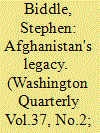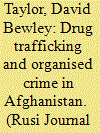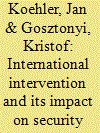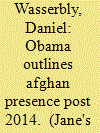| Srl | Item |
| 1 |
ID:
133161


|
|
|
|
|
| Publication |
2014.
|
| Summary/Abstract |
The war in Afghanistan is not over. Nor is it ending any time soon. The U.S. role may end in 2016, in whole or in part, but the war will continue-and its ultimate outcome is very much in doubt. The conflict is now stalemated militarily, and will likely stay that way as long as outsiders pay the large bills needed to keep the Afghan National Security Forces (ANSF) in the field and fighting. The war will thus grind onward until this funding dries up or the two sides negotiate a compromise settlement, neither of which is imminent. Depending on how any talks unfold, historians in 2050 could thus look back on this war as a costly but tolerable outcome for the West, as a wasteful disaster, or as something in between; for now, all we know for sure is that it continues.
|
|
|
|
|
|
|
|
|
|
|
|
|
|
|
|
| 2 |
ID:
124735


|
|
|
|
|
| Publication |
2013.
|
| Summary/Abstract |
In November 2013, the UN's Afghanistan Opium Survey reported a 36 per cent rise in opium poppy cultivation, with opium production up by almost half since 2012. This situation has long been recognised as a security threat, with effective programmes to address the complex links between opium trafficking, organised crime and insecurity in Afghanistan more important than ever given the transfer of responsibility for security and governance, by the end of 2014, to the Afghan government. David Bewley-Taylor questions the current focus of counter-narcotics policies and highlights the key challenges likely to impede the reduction of organised crime in Afghanistan post-2014.
|
|
|
|
|
|
|
|
|
|
|
|
|
|
|
|
| 3 |
ID:
133140


|
|
|
|
|
| Publication |
2014.
|
| Summary/Abstract |
The challenge of building a security sector effective in terms of protecting the population and the state from challengers, and which at the same time fulfils minimum standards of good governance, was a daunting one in Afghanistan. These difficulties were compounded by what in hindsight seem to be obvious mistakes on the part of the intervention. In our paper, we investigate how security sector building fared under such adverse conditions in north-east Afghanistan. We find that in spite of the formidable challenges and the mistakes made by the international intervention, it did not fail completely. Neither did it succeed. Based on the results of quantitative surveys and qualitative research, we suggest that (a) the international intervention was partly successful in building up Afghan National Security Forces - both as a fighting force and in terms of security sector institutions that are restrained to some extent by the rule of law; (b) the problems caused by setting up informal local militias (violent feuds, criminality, human rights abuses and extortion of the population) could be partly mitigated by transforming them into an official local police programme.
|
|
|
|
|
|
|
|
|
|
|
|
|
|
|
|
| 4 |
ID:
131158


|
|
|
|
|
| Publication |
2014.
|
| Summary/Abstract |
US President Barak Obama has announced that the United States aims to keep, 9800 troops deployed in Afghanistan after the current force agreement expires at the beginning of 2015, but he would then extract most US forces before 2017.
|
|
|
|
|
|
|
|
|
|
|
|
|
|
|
|